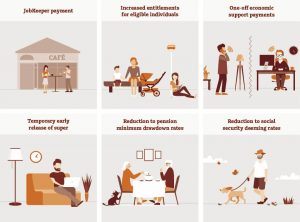It’s easy to think you’ll never get ahead when you have mounting bills to pay, on a reduced or lost income and limited savings, all because of a pandemic that no one saw coming.
But, it can be done.
Take confidence in knowing that with determination, understanding the support options available to you and having a realistic plan, debt and bills can be managed.
In this article, we’ll address six steps that could help to get you back on track with managing your debt during COVID-19.
1. Understand how much you owe
The first step is to add up all of your debt, to get a clear picture of what you owe.
While laying all your cards out on the table can be extremely confronting, especially if you’ve never done it before, it’s a critical step to see the bigger picture of your financial situation.
2. Keep track of your expenses and income
The next step is to work out how much you can afford to pay to cover your debts.
Having a clear picture about what you earn versus what you spend, can highlight areas where you may be able to pull back spending. Whatever income you’re able to save can then be allocated towards your debt. There are budget planners and phone apps you can use to track your spending. Alternatively, you can simply download your bank statements and keep a record of your receipts. Make sure to include everything from your necessities like rent or mortgage, utilities and transport to what you spend on non-essentials like entertainment.
3. Investigate the support options available to you
Depending on your situation, there are a number of ways you can get financial assistance to deal with the impact of COVID-19.
Financial and banking institutions
Some banks are now allowing customers to defer their mortgage repayments temporarily, in addition to refunding late fees and interest for credit card payments.
It’s important to remember that while this option might help with your short-term cash flow, interest will continue to be charged to your outstanding loan amount – meaning more interest could be payable over the term of the loan. It’s also worth checking with your bank to ensure these offers apply to you.
Government response packages
The Federal Government is supporting individuals and families affected by COVID-19 through a range of measures, including:

Read MLC articles for more detail about these measures and if they apply to you.
4. Develop a plan to manage debt
Now that you’ve identified how much you owe and the financial assistance available to you, the next step is to develop a plan.
Having a debt management plan in place that’s realistic to follow, can help you manage your debt to achieve your goals. But remember to keep a long-term view. You want to ensure that this isn’t a just a temporary fix, otherwise the problems could kick up again.
Set priorities
If you have more than one outstanding debt, consider working out how much you can repay on each, based on the minimum repayment owing.
Alternatively, if you’re able to repay more than the minimum, look at prioritising your debts. You’ll need to think about things such as the type of debt you have -for example, an investment loan, or personal debt – and how much is owing.
For example, if you only have personal debt, you may choose to prioritise repaying debts with the highest interest rate first, given these will be costing you the most to keep them around longer.
At the end of the day, the approach you take is a personal one but it’s important to have a plan and stick to it. And that could mean making other changes.
5. Set aside a savings fund for emergencies
Whilst you can never prepare for events like COVID-19, there are things you can do to ensure when these types of situations arise, you’re able to get through them.
One approach may be to set up a savings fund for emergencies, where you transfer a small amount of your income to a high interest savings account on a weekly, fortnightly, or monthly basis. This will then provide a financial safety net which you can draw on when you really need it.
6. Seek professional support
Managing debt is not something that comes easily to most people, so sometimes speaking to a professional can help put your mind at ease.
A financial adviser will assess your situation and provide you with a manageable repayment plan, which may see you pay your debt off faster.
Bottom line: the most important thing to remember is that you can get ahead with managing your debt during COVID-19, but it will require some changes and reprioritisation. Use the various resources and support available to you and stick to a plan. You can do it!
We’re here to help, contact Dev Sarker at 1300 717 136 today.
Article source: https://www.mlc.com.au/personal/blog/2020/06/manage-debt-during-covid-19
